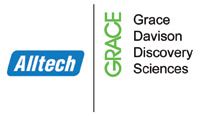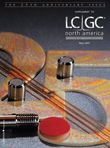Corporate Retrospective 2007: Grace Alltech
Alltech Associates Inc. has been an expert in HPLC column chemistry since 1971.
Alltech Associates Inc. has been an expert in HPLC column chemistry since 1971. Over three decades Alltech grew into a leading supplier of HPLC columns and introduced technologies for both gas and ion chromatography. By the turn of the century, Alltech had become a one-stop-shop for all chromatography needs, including an impressive selection of columns, accessories, and and instruments including the evaporative light scattering detector. Through Alltech's bi-annual Chromatography Sourcebook and advertising relationship with LCGC, Alltech's products gained recognition and popularity in the marketplace.

In August 2004, Alltech underwent an exciting transformation - the acquisition by Grace Davison, a division of W.R. Grace. Since 1921, Grace has led the way in researching and refining silica's properties and capabilities in the fields of analytical, preparative, and process scale chromatography. The marriage of Grace and Alltech, along with Grace's acquisitions of Vydac, Jones, and MODcol, gave rise to Grace Davison Discovery Sciences - a powerful combination of expertise in silica manufacturing, bonded phase chemistries, and column hardware technologies.
Looking toward the future, Grace Davison Discovery Sciences will focus on our core silica technologies to serve the breadth of HPLC activities from the smallest nanoscale columns to large-diameter preparative columns, as well as bulk silica for process-scale recovery applications. Through Alltech's expertise in small molecule separations and Vydac's expertise in protein and peptide purifications, Grace Davison Discovery Sciences addresses a full range of chromatography applications from pharmaceutical and biotech to environmental and petrochemical.
Alltech has come a long way in the last 30 years, since the first column packing operation in the owner's garage. As Grace Davison Discovery Sciences we have an extensive global organization with centers of excellence around the world for research and development, manufacturing, and long-term customer partnerships. When you think of Alltech, think of Grace, and rely on us as more than just a column supplier - we are your chromatography partner for instruments, columns, and accessories from discovery to recovery.
Look for Grace Davison Discovery Sciences advertisements in LCGC every month.

Robert Gatte
Robert Gatte
Vice President and General Manager
Grace Davison Discovery Sciences
Deerfield, Illinois

Determining Neurotransmitters in Spinal Cords with UHPLC
February 18th 2025Researchers at Jilin University (Changchun, China) developed a highly sensitive, rapid, and accurate method for analyzing neurotransmitters (NTs) in rat spinal cord tissue. Ultra-high performance liquid chromatography-triple quadrupole tandem mass spectrometry (UHPLC-QqQ-MS/MS) in conjunction with ultra-ionic liquid dispersive liquid-liquid microextraction (UA-MIL-DLLME) were used to extract NTs for analysis.
The Next Frontier for Mass Spectrometry: Maximizing Ion Utilization
January 20th 2025In this podcast, Daniel DeBord, CTO of MOBILion Systems, describes a new high resolution mass spectrometry approach that promises to increase speed and sensitivity in omics applications. MOBILion recently introduced the PAMAF mode of operation, which stands for parallel accumulation with mobility aligned fragmentation. It substantially increases the fraction of ions used for mass spectrometry analysis by replacing the functionality of the quadrupole with high resolution ion mobility. Listen to learn more about this exciting new development.
Revolutionizing LC-MS with Next-Gen Separation for Cyclic Peptide Analysis
February 17th 2025Cyclic peptides, known for their stability and high specificity, are promising therapeutic agents in the fight against cancer, infections, and autoimmune diseases. However, developing effective cyclic peptides presents numerous challenges, including poor pharmacokinetics, efficacy, and toxicity. Traditional methods like liquid chromatography tandem-mass spectrometry (LC-MS/MS) often struggle with resolving isomeric linear peptide metabolites, posing significant risks in safety, efficacy, and regulatory approval. In this paper, Komal Kedia, PhD, will share how she leveraged MOBIE’s high-resolution ion mobility-mass spectrometry (IM-MS) system to achieve a 72% reduction in run times, 200% greater resolving power, and enhanced accuracy in identifying “soft spots” prone to enzymatic degradation.
























